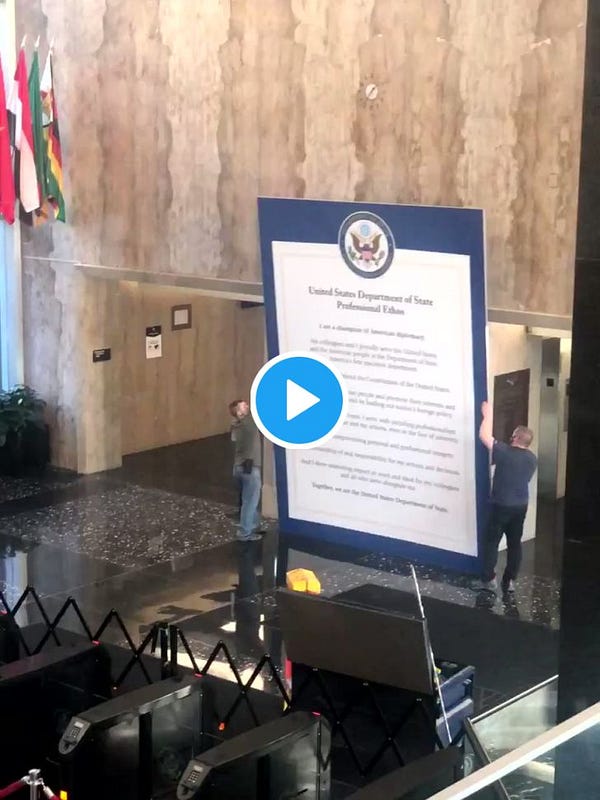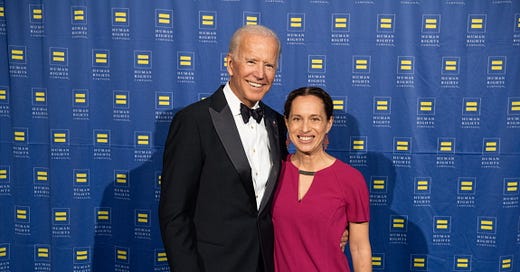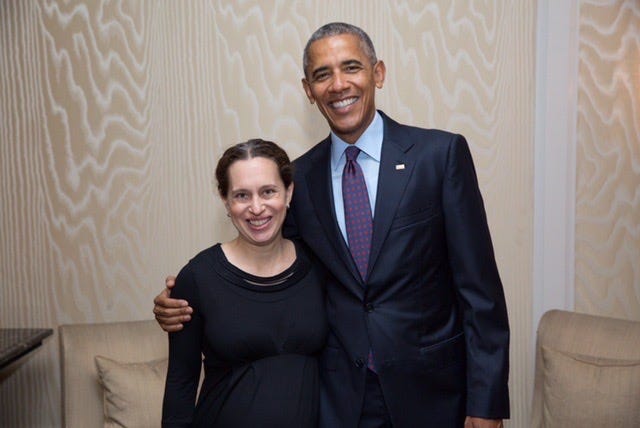Lauren Baer is an attorney and foreign policy expert who served for six years as an official in the Obama administration, acting as a senior adviser to Secretaries of State Hillary Clinton and John Kerry, and to U.S. Ambassador to the United Nations Samantha Power. She was also one of the top names put forth when I sent out a call for recommendations about “women to watch in foreign policy and national security.” The adjective “brilliant” was tossed around a few times….
In 2018, Lauren was the Democratic nominee in Florida's 18th District. Last year, she founded More Like America, an organization dedicated to electing leaders who are more reflective of the diverse communities that they serve. Below is a free preview of our conversation.
When you look back on your work for the State Department under Secretary Clinton and Secretary Kerry, are there any achievements that hold new meaning with hindsight?
When I look back at the work I did over six years in the Obama Administration, it’s easy to see a common thread: all of it was undergirded by a deep faith in American values, and a belief in the expansion of rights and liberties, both at home and around the world. Whether it was our work to promote LGBTQ equality, protect religious minorities, provide safe haven for refugees, or countless other efforts, big and small, there was an abiding trust, in the words of Dr. Martin Luther King Jr., that “the arc of the moral universe... bends towards justice.”
The Trump years made plain, however, that justice is not an inevitable end point; that, without proper guardrails, freedom can contract more quickly than it expands; and that all of our achievements were fragile. I still believe that the American story is one of progress. But with hindsight, I am more appreciative than ever of the work it takes to preserve gains, and the diligence with which we need to fight every day to safeguard the norms and values we too often take for granted.
So, at this moment of transition, I do find myself reflecting, both on the fragility of the American experiment and the power and potential of Americans to make change. With Biden’s inauguration, wise and ethical people will again hold the reins of government, but it is up to all of us, wherever we are, to make good on the moral promise of this great country.
Who are the new members of the foreign policy establishment within the Biden administration that you are most excited to follow?
I am both excited and relieved to see the return of experienced, honest, and empathetic foreign policy makers in the Biden administration. During my time in government, I had the opportunity to work with almost all of the individuals now leading Biden’s foreign policy team, and I know them to be profoundly smart and principled people. We are in good hands with Tony [Blinken], Jake [Sullivan], Jon [Finer], Wendy [Sherman], Linda [Thomas-Greenfield], Avril [Haines], Samantha [Power], Uzra [Zeya], and so many others stepping up to serve.
At the same time, I am eager to watch the next generation of foreign policy leaders emerge, and to see the civil and foreign service officers so disparaged by the Trump administration returned to their rightful place of respect.
Making our foreign policy work for the American people requires the dedicated work of thousands, not just the handful who are in the spotlight, and I would love to see us highlight their work and tell their stories in the coming years.
How has the pandemic impacted your life at home?
At every stage of our journey as parents, my wife and I have negotiated and divided caregiving and other household responsibilities. And we’ve done this as two women who are independently ambitious and in their prime working years. While we strive for equity, there is always a give and take. My run for Congress was enabled by her taking on more caregiving and wage-earning responsibilities for more than a year. Her work at a rapidly growing startup before that was facilitated by me taking on the bulk of the labor at home.
Still, the pandemic has been a strain unlike anything we have previously experienced, and I say this knowing that we have lived through it with good fortune not shared by so many, having remained healthy and employed in jobs that we could do remotely.
For the first four months, we weathered lockdown without childcare, working in shifts. My wife would work from 6 am to noon, while I’d watch our young daughter; we’d switch from noon to 6 pm; and then we’d both bat cleanup on work after our daughter went to bed. It was exhausting, physically and emotionally. Things improved for a bit in the summer months as declining COVID rates allowed our regular childcare to resume, but I write this with us having temporarily lost childcare again after exposure to someone COVID-positive last week pushed our family into a 10-day quarantine.
Our scenario isn’t unusual, and, in many ways, is easier than what so many are experiencing. Throughout the country, women are being forced out of work to care for sick family members and children, or because they cannot do their jobs safely, or because their wages do not cover the costs of childcare.
This has called the question as to what our country can and should do to support working women. And it warrants solutions that are more bold than the commonly referenced proposals of guaranteeing sick and family leave. Don’t get me wrong, these are absolutely necessary; but universal sick leave and family leave are a floor, not a ceiling. We need to develop pathways to universal childcare, rethink the public education system to account for a world where most children come from dual wage earner families, and incentivize working arrangements that allow women (and men) to meet their responsibilities as both caregivers and workers.
The full conversation with Lauren will be published for paid subscribers later this morning.
New Jobs! Old Commitments! Sayonara Swagger!












And finally…


Did I miss anything memorable? Share in the comments. You can also follow me on Twitter @jenkoons. See you on Monday.








